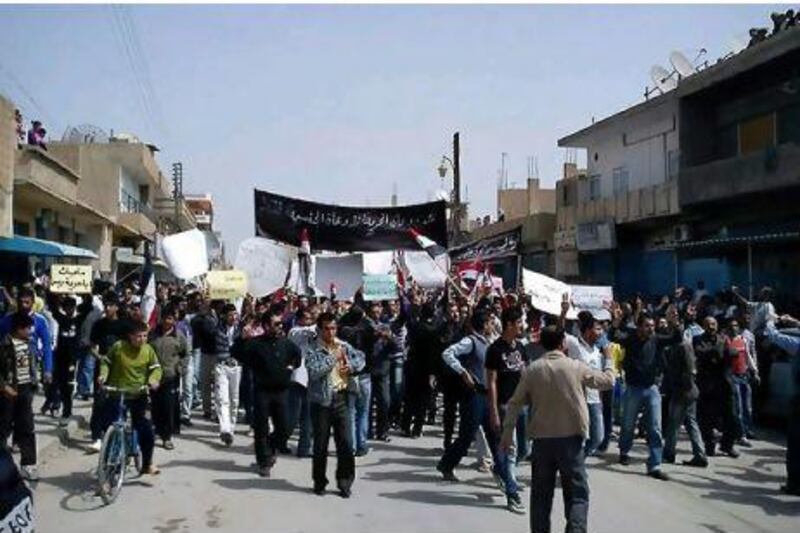DAMASCUS // Anti-government demonstrations continued in Syria yesterday, with at least four people shot dead in a Damascus suburb, according to rights activists.
Other reports put the death toll between eight and 10 in Douma, 15 kilometres north of the Syrian capital, when police opened fire after protesters emerging from a mosque attacked them with stones, a witness told Agence France-Presse. The witness said security forces fired tear gas at the protesters to disperse them before firing live rounds.
"Dozens of people were also wounded and the security forces arrested dozens of others," the witness said, adding that police had arrested some of the wounded, preventing them from going to hospital for treatment.
Details of the apparent shootings remained unclear late yesterday, with the area sealed off by security forces. A civil rights campaigner in Damascus told The National four people had been fatally shot, and "many more" wounded by gunfire.
"The situation there is very tense and angry at the moment, there is no clear way of knowing how it will end," he said last night, on condition of anonymity. "It's confusing because last week there were protests at the same place and no one was killed. We don't know what has happened this time."
According to the witness in Douma, around 3,000 worshippers had taken to the streets after weekly prayers.
The witness in Douma said the 3,000 protesters had emerged from different mosques in the town, though other reports said there were fewer protesters.
None of the claims can be independently verified because access to the area is restricted.
There were also unconfirmed reports from a human-rights activist that at least three people were killed yesterday in the southern village of Sanamen near the flashpoint city of Deraa, when security forces opened fire to disperse a protest.
The Syrian authorities have yet to comment on the incidents, but have blamed foreign agitators or Islamist militants for acts of violence since anti-government protests began last month.
If confirmed, the fatal shootings by security forces could lead to the situation in Douma spiralling out of control. In Deraa, 100km south of Damascus, a sustained uprising involving tens of thousands of people was triggered, at least in part, by heavy-handed tactics of security forces. Four civilian protesters were shot dead on March 18 in a rally calling for 15 arrested children to be released. Scores of civilians were subsequently killed, civil rights activists said, when security forces moved in to quash dissent in the area.
"The key will be to see if Douma now snowballs in the same way Deraa did," said a Syrian political analyst, who also spoke on condition of anonymity. "People in Douma have been protesting for the release of arrested teenagers and now there have been shootings, so we could see a repeat of Deraa but this is much closer to the capital."
Yesterday had been billed as a critical point in determining Syria's future, following a speech on Wednesday in which Bashar al Assad, the Syrian president, defied expectations that he would make immediate political reforms and, instead, had called protests part of a "conspiracy" that he was prepared to fight against.
In response, protesters called for nationwide rallies for Friday, a traditional day for public gatherings after communal Muslim prayers.
In addition to Douma, there was a demonstration yesterday in Kafa Sousa, an upmarket neighbourhood of Damascus. The area was sealed off by security forces, with reports from witnesses saying some 200 people had chanted for freedom in the Rifaii mosque.
In Deraa, protests continued and a large, well-organised demonstration took place in the port city of Baniyas, with painted banners calling for freedom and an end to rampant corruption.
In Homs, protesters faced larger crowds of pro-government demonstrators, with reports of clashes between the two groups.
Some members of Syria's Kurdish community appeared to have joined in demonstrations, with rallies in Qamishli and nearby Amouda, in the north-east of the country - all peaceful and brief, according to witnesses.
Syrian state media acknowledged that crowds had taken to the streets in Latakia and Deraa demanding speeded-up government reforms, but said the situation in the country was calm.
Hopes of anti-government protesters that a decisive national uprising would begin have not materialised. The vast majority of Syrians remained in their homes, as they have done throughout more than two weeks of unrest.
Yet efforts by the authorities to comprehensively snuff out public dissent, through heavy security measures and promises to consider political reforms, did not prevent thousands of Syrians from, once more, openly express their displeasure with their rulers - something unheard of as recently as a month ago.
The day's events were indecisive, the Syrian analyst said. "Half and half, it's not obvious yet which way things went," he said. "On the one hand, there were still protests, but they did not escalate."
Since the outbreak of open dissent in Syria last month, more than 55 people have been killed by security forces, according to human-rights activists, a figure the government disputes. Mr Assad has set up a committee to investigate the violence in Deraa and the port city of Latakia, areas that have seen the greatest unrest.
psands@thenational.ae





